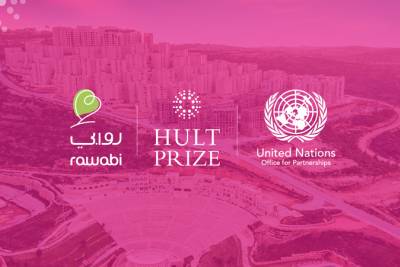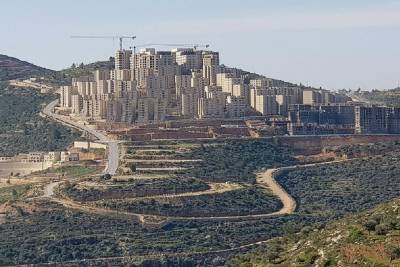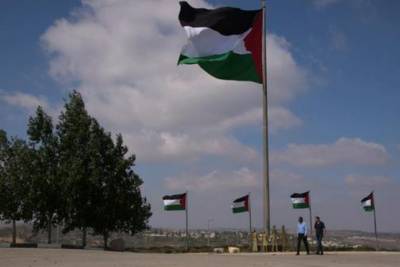A gift to Palestinians A gift to Palestinians
Gulf Property - Indrajit Sen - Construction underway at the Rawabi community in West Bank, Palestine. Despite high possibility of Israeli attack and demolition, people in Palestine live in hope that one day peace will return to the territory
With help from a Qatari partner and support from a cashstrapped government, here’s a Palestinian property developer who has endeavoured to build not just a residential project but an entire city.
Rawabi is a new community for Palestinian families that will provide opportunities for affordable home ownership, employment, education, leisure and an attractive environment in which to live, work and grow. Rawabi, the first Palestinian planned city, is a bold initiative in both its facets: a new population center for Palestine and a courageous economic initiative that will contribute to permanent new job creation and sustainable long-term growth for the Palestinian economy.
The new city, located in the West Bank and close to Ramallah and Jerusalem, integrates international best practices for urban master planning, sustainable environmental policy, regionallysuited architecture and state of-the-art infrastructure for residents, enterprises and visitors.
Rawabi provides more than 5,000 housing units with multiple floor plans spread across 23 neighbourhoods, intends to eventually house 40,000 people. Through attracting investors and technology suppliers, Rawabi plans to generate more than 5,000 permanent jobs, creating quality of life and making a long-term, sustainable contribution to national prosperity.
Bayti Real Estate Investment Company, the developer of Rawabi, is jointly owned by Palestinian realtor Massar International and Qatari Diar, the development company owned by the Qatari government.
The joint-venture company was established to jump-start the development of the Palestinian real estate sector with a mission to create affordable, accessible, familyfriendly communities and create several thousand direct and indirect employment opportunities for Palestinians, providing multi-level stimulus to the national economy.
In an exclusive interview with Gulf Property, Bashar Masri, Chief Executive Officer of Massar International talks about Rawabi, the Palestinian Authority’s role and the Israeli threat looming over the city.
Gulf Property: How do you describe your company and its mission? How big is the workforce? Do you operate just from Ramallah or do you have branches; if yes where? What are the services you offer your clients?
Bashar Masri: The city of Rawabi is being developed by Bayti Real Estate Investment Company is a joint venture between my organisation Massar International and Qatari Diar. Massar International has 25 subsidiaries operating in Palestine, Egypt, Jordan and Morocco. Massar and its subsidiaries employ roughly 1,500 people in the region, excluding those working at Rawabi. Rawabi alone employs about 4,000 Palestinians.
Massar International offers services in the areas of real estate development, information and communications technology and financial services.
From what it appears, Rawabi is not just a real estate project but a planned city, with special amenities. Can you elaborate on the salient features of this project?
Yes. Rawabi, the first Palestinian planned city, is the largest private sector project ever carried out in Palestine. The city integrates international planning principles, sustainable environmental practices, regionally-suited architecture, state of-the-art infrastructure and ease of access for both residents and visitors. Its amenities, which include a commercial center, art spaces, educational and medical facilities, will make it a destination as well as home for all Palestinians.
Rawabi will initially be home to 25,000 residents, with additional residential and commercial units slated for subsequent construction phases that will ultimately serve a city with a population of more than 40,000.
Located 9 kilometre north of Ramallah and 3.5 kilometre north of Birzeit, Rawabi lies 25 kilometre to the north of Jerusalem and 25 kilometre south of Nablus. The view west from Rawabi’s hilltops offers a panorama of the Mediterranean coast.
Rawabi’s municipal boundaries will encompass 6,300,000 square metres of land.
The investment for this project has been over $1 billion. What has been the source of finances? Have you sought bank finance?
Funding for the construction of the new city has been provided primarily the two joint venture shareholders of Bayti Real Estate Investment Company: Massar International and Qatari Diar.
A few donors provided small amounts of targeted funding early on for feasibility studies related to the provision of public services and for some components of the city’s public infrastructure, including a $5 million grant from the United States Agency for International Development for the initial phases of construction of the city’s road network.
Rawabi is, however, a private sector undertaking and virtually all of the capital required for construction has come from Bayti.
How many and which categories of residential units, namely studio apartments, 1, 2 and 3 bedroom apartments, penthouses or villas, will be there in Rawabi?
The majority of the 5,000 housing units constructed in are 2 and 3 bedroom apartments designed for family living.
Some buildings also feature one-bedroom apartments, but in general cultural preferences and lifestyles inPalestine create more demand for the 2 and 3 bedroom models.
A very limited number of high-rise penthouse apartments are found in the residential towers located in the heart of the downtown area, the City Center. Rawabi at the moment has no singlefamily homes, or villas, under construction but the masterplan does include villas in later construction phases.
When fully built, Rawabi will offer homes to suit the taste of families and individuals at all stages of life and socio-economic strata, but the focus is to build homes accessible and attractive to working Palestinian families and professionals.
What is the pricing structure of housing units in Rawabi? How would you rate living in Rawabi as: Affordable or expensive?
Ninety percent of apartments at Rawabi range between 92 square metres to 240 square metres in size starting at $60,000 and up to $150,000.
The rest 10 per cent of them reach up to 340 square metre and their price differs according to their location and features.
With the introduction of mortgage lending with favourable terms by Palestine’s major banks, all of whom are on-site at Rawabi, the cost of buying a home at Rawabi is well within the reach of most working Palestinians.
The pricing structure of Rawabi homes was a critical consideration for the project; obviously, if these homes were not affordable to our target market, we couldn’t sell them.
Will Rawabi house retail units, cinemas and hotels? If yes, which brands?
Rawabi’s downtown area, the City Center, will feature many exciting retail, entertainment and accommodation opportunities, including a pedestrian promenade.
We have a 7-screen 4-D movie theater under construction (the first in the region), international retailers, including clothing stores, home goods outlets and restaurants, and a hotel.
Many of our favourite Palestinian stores and cafes will also be found at Rawabi, and each neighbourhood will offer convenience retail as well.
To top that off, we are building a 12,000 seat outdoor amphitheater for outdoor concerts, and the city is full of parks and walking trails. If you haven’t found what you’re looking for in terms of retail, entertainment and healthful living at Rawabi, you probably need to just stroll down the block a bit further.
What was your strategy regarding promoting the project in Dubai? How was the response? Are investors from Dubai and the GCC pooling money in Rawabi?
The response was exciting.
Many Palestinians living in the UAE and in the Gulf had heard of Rawabi, but didn’t really quite yet believe it had become a reality. Our prime objective was to showcase the project to them so that they could purchase a home back in Palestine.
Undoubtedly, our goal is to create a modern living environment in Palestine that competes with the comforts and conveniences found in regional capital cities.
Rawabi is designed not just for Palestinians living in Palestine today, but also to encourage many of the thousands of Palestinians living abroad to seriously consider coming home – to work, to live and to grow right here in Palestine. We believe we made great strides towards that goal.
Our promotion in Dubai was intended to also attract potential investors as well.
We are now focused on attracting companies to base operations at Rawabi. Bayti Real Estate Investment Company is a collaboration between Qatari Diar and Massar International.
So can we consider this joint venture to be a proof of Qatar’s keen interest in Palestinian affairs and its commitment to developing the Palestinian economy?
Qatar has always been a strong supporter of economic development in Palestine, and their investment in Rawabi is proof of that.
We are business partners working through private-sector development to achieve a shared goal of long-term Palestinian prosperity and quality of life for the Palestinian people.
What is distinct about Rawabi is that it has its own municipality. Will there be more support from the government in terms of organising police stations, hospitals and other civil services?
Rawabi is fully-incorporated Palestinian municipality, which means we have established strong local governance structures in accordance with Palestinian law, under the oversight of the Palestinian National Authority, like all other municipalities in Palestine.
Mayors and municipal councils, such as ours at Rawabi, are responsible for coordination of the provision of public services within the city limits, under the overarching framework of the laws and requirements of our national government.
But the Palestinian Authority does not own Rawabi, as it does not own Nablus, or Ramallah, or any other municipality in Palestine.
Typically, governments do provide funding for all the public infrastructure of cities. However, this is not the case in Rawabi, due to the special circumstances of the PA and its limited budgets. So the public infrastructure of the city had to be financed and built by Bayti, without financial
help from the PA.
It should be made clear, though, that the PA is very supportive of Rawabi and has exerted a great deal of effort creating an enabling environment for the project, even if they could not finance its public infrastructure.
Is there any threat of Israeli occupation looming over Rawabi? Are there any Israeli settlements nearby?
The occupation is of course a factor that has created numerous obstacles, some of which are extremely serious and as yet remain unresolved.
To date, the Israeli government has withheld approval for us to widen the main road that leads to Rawabi. Even more importantly, we are still without approval to tap into the main water supply.
It is impossible to understate the severity of those problems. These issues have been highlighted repeatedly in the international press. These are not problems we can solve on our own – the solution lies in government action.
We press forward with construction, however, we have never lost hope that the resolution will be achieved in the future.
Yes, there are several settlements nearby, but they do not pose significant problems for us, except in the macro sense.
At this point, Rawabi is too big to be threatened by small groups of troublemakers. Palestine needs ten more Rawabis.
Depending on Rawabi’s success, will Bayti Real Estate Investment Company create more such planned cities in future in the West Bank and Gaza?
Absolutely. We would love to replicate this success. As well, we welcome industry growth as other Palestinian real estate developers scale up and join us – there are a number of great projects already underway.
We are a young country with a huge demand for new housing, which will only become larger as the population grows.
From the real estate industry perspective, the outlook is very bright. We are all working towards the same goal – every job we create, every home we build for a Palestinian family takes us that much closer to realising the dream of a peaceful Palestine.
To view original article, Click Here.



